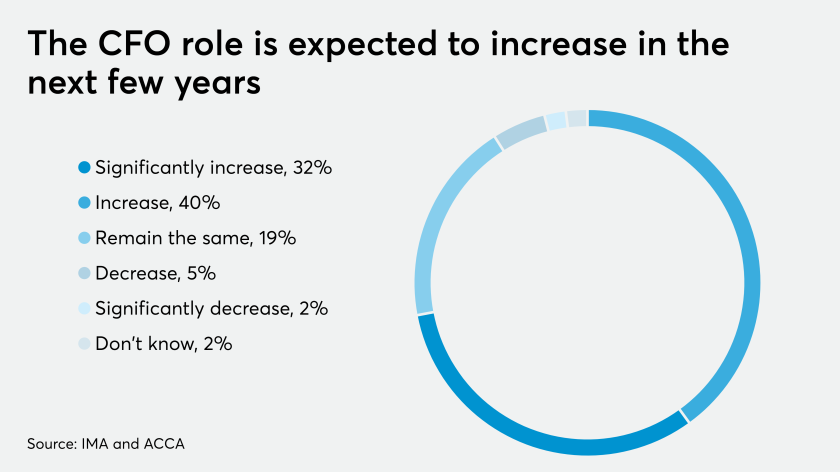CFOs are assuming a greater role at their organizations in the midst of the COVID-19 pandemic and are likely to hold onto those greater responsibilities once the pandemic subsides, according to a new report from the Institute of Management Accountants and the Association of Chartered Certified Accountants.
For the report, the IMA and ACCA surveyed 1,152 of their members and found that 72 percent of the respondents believe the role of the CFO will either “increase or increase significantly” in importance. Seventy-eight percent of the respondents indicated that the ethical lens was a differentiating factor for the CFO in comparison to other executives. Meanwhile, 82 percent of the CEO respondents surveyed feel the role of CFO would increase or significantly increase in importance, and 68 percent of CEO respondents say that people highly value the strategic insights of CFOs.
Koonce is the Chief Claims Officer, for Sedgwick. In this role, Koonce is responsible for product development and innovation, industry analysis and thought leadership, best practices and compliance standards, legislative and regulatory relationships, and continued involvement in client programs for Sedgwick's lines of business.
Prior to his current role, Koonce was the Managing Director responsible for Sedgwick's casualty retail business unit in which he oversaw program results and service execution across the company's retail customer base. This included use of innovation and technology to improve client outcomes and customer experience.
Prior to joining Sedgwick, Koonce was senior director of risk management for Walmart Stores, Inc., the nation's largest private sector employer. In this role, he managed the retailer's domestic property and casualty claims program. He simultaneously served as president of Claims Management, Inc., Walmart's wholly owned third party administrator.
David Schwartz is the president and CEO of the Financial International Business
Association, or FIBA, where he promotes growth and advancement in international
banking and finance through education, advocacy and networking. With extensive
experience in international banking and compliance, David has held leadership roles at
institutions like Regions Financial Corporation and Banque Sudameris. Fluent in
multiple languages, he holds a Juris Doctorate from New York Law School and a black
belt in Shuri-Ryu Karate. He also serves on various community boards and actively
contributes to educational and health organizations in South Florida.
Matt Gilbert is VP, employer brand strategy at Appcast, the leading recruitment marketing platform powered by programmatic. With nearly 20 years of industry experience in employer brand, EVP and recruitment marketing. Matt is a recognized thought leader, industry speaker, and innovator, having developed and activated over 350 employer brand programs since entering the field. He and his teams have earned numerous industry awards in employer branding and other B2C areas. Matt is a sought-after employer brand expert and has worked with numerous notable organizations in employer brand such as Expedia Group, Disney Cruise Line, PepsiCo, Nike, Tyson Foods, Carmax, Pfizer, Aramco, Lockheed Martin, HCA, Conagra, Gallo Winery, Hanes Brands, American Red Cross, the ASPCA, Condé Nast, Amtrak, JPMorganChase, PayPal and more.
“This is in a sense a followup study to a joint study we did with the ACCA eight years ago and we had made predictions back then about how the role of the CFO would change,” said IMA vice president of research and policy Raef Lawson. “It was extremely rewarding to see that our predictions were right on. We had predicted that the role of the CFO would be transitioning from financial reporting and stewardship to more of the strategic business partnership role, more engaged through external stakeholders. That’s all taken place. The interesting thing is that the pandemic seems to have just accelerated this change.”

It’s no longer enough for CFOs to simply oversee the finances at the companies where they work. More and more, they’re playing an essential role in the management and governance of their organization. “That entails not only an immediate focus on cash management and cash flow, which are incredibly important during the pandemic, but having a broader engagement in the operations of their organizations and being more involved in the strategy formulation of their organization,” said Lawson. “What we envisioned about the CFO eight years ago is really now essential for organizations. CFOs have a unique perspective of their organizations. They see all the moving parts and help their organizations adjust their strategy and implementation of that strategy, almost on a real-time basis.”
The IMA and ACCA see various ways in which the future role of the CFO seems to be evolving. The CFO may become more focused on stakeholder and investor management rather than safeguarding and reporting. The CFO will likely have a leading responsibility for business strategy formulation, validation, and execution. The focus of the role seems to be shifting from mostly historic-based cost control to growth optimization. The role is likely to encompass measurement of all aspects of the strategic objectives of the organizations. The CFO will provide the greatest value to the organization through forward insight rather than retrospective reporting. According to some respondents, CFOs are increasingly expected to eventually take on the CEO role as the next progression in their career development.
The urgency of the pandemic and the recession it caused have accelerated that increasing role for the CFO, forcing a reexamination of the company’s strategy, risks and business model. It has also forced technological changes such as the need for remote work arrangements.
“Technology is something that we have emphasized a lot at IMA in terms of changing the role of finance in general and the CFO, but this has accelerated the technological transformation of finance,” said Lawson. “We’re all working from home now, or many of us are, learning new technological skills that we probably wouldn't have done otherwise. Not just in terms of working from home skills and communication, but moving to the cloud has become accelerated. We’re all learning new ways to improve our processes to be more efficient, This transformation has been accelerated by the pandemic. The old saying is may you live in interesting times, and COVID has certainly made these times very interesting for CFOs. It’s made the role more challenging, but also made it more essential to the survival and prosperity of their organizations.”
The survey didn’t ask about specific technologies, but it did ask about what priorities were on the CFO’s agenda, and transformative technology was cited as one of the biggest challenges for CFOs. “I think their technological plans probably went out the window or had to be accelerated by the coronavirus,” said Lawson. “It necessitated the introduction of new technologies like Zoom or Microsoft Teams. For many companies, it’s been an adjustment, but those that made the adjustment have seen how more effective and efficient their finance functions are. I think that many businesses won’t go back to business as usual.”
Technical skills are considered to be important, with 54 percent of the survey respondents saying that an accountancy qualification or master’s degree is essential, with 27 percent considering it to be strongly recommended but not essential. Only 2 percent believe neither is needed.
The economy seems to be recovering since the start of the pandemic, but the continuing spread of COVID-19 across the U.S. and other parts of the world leaves many business leaders uncertain about the future.
“The economy is recovering, but it’s going to take time and it looks like there will be bumps in the road in this economic recovery,” said Lawson.
The outcome of the November election is another uncertain factor weighing on the minds of CFOs. “I don’t want to get into politics, but I think the different major parties have different economic agendas and different approaches to handling the pandemic and stopping its spread, so I think the election could have a major impact on the recovery,” said Lawson.
More and more CFOs are getting involved in supply chain issues after experiencing shortages at the start of the pandemic. “One of the interesting results from our current study is that CEOs seem to place more emphasis on the supply chain, which perhaps is due to their broader perspective, but regardless of that, the supply chain is a critical issue as we’ve come to see with the supply chain disruptions brought about by the pandemic,” said Lawson. “CFOs can no longer ignore that part of the business and the risks that supply chain disruptions can bring.”



